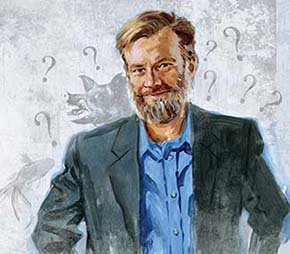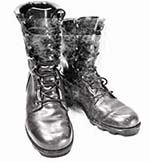 |
 |
| current issue |  | past issues |  | send a letter/news |  | address update |  | advertise |  | about us |  | alumni home |
Features
|
Philosophy Matters
Think Philosophy is just an intellectual exercise? Try sitting in on one of Nick Smith's classes. |
Make a comment |
 Joseph Adolphe |
On September 11, 2001, around 9 a.m., Nick Smith arrived for his first day on the job at an international law firm in midtown Manhattan. The recruiter who greeted him in the lobby told him the news: An airplane had just flown into the World Trade Center. The firm remained open, in its hermetically sealed skyscraper 4 miles away from the twin towers, and Smith experienced 9/11, like most Americans, mainly through television. Later, as sirens wailed long into the night, his new employers were already at work on the legal question that would be assigned to him the next day: Did the 9/11 attacks on the World Trade Center constitute one "occurrence" or two? It was a $4 billion question. For one event, the buildings' insurers would pay only once; for two events, they'd have to pay twice.
As a lawyer, Smith found the issue complex and absorbing. But he had been chosen for the task in part because he also had a doctorate in philosophy. And as a philosopher, he spent the months following 9/11 questioning the value of devoting his days—not to mention his 100-hour workweeks—to the task of "making the rich a little richer" at a firm representing insurers and reinsurers, the companies that insure insurance companies. So he left that life. Had he stayed, he might well be making five times as much money as he does today. Instead, he's an associate professor of philosophy at UNH, which he describes as "the coolest job in the world."
The stereotypical image of philosophy—dusty tomes written by Germans with hard-to-pronounce names, ponderous terms like epistemological and teleological, medieval arguments about angels and pins—is perhaps the antithesis of cool. But Smith defies the stereotype. (He does have a beard. Asked if that's a requirement for a male philosopher, he says, with a smile, "It's necessary, but not sufficient.") Smith's brand of philosophy "gets you in the gut rather than just the brain," says Dustin Newhouse '15, a philosophy major. "Boots on the ground," says Newhouse, is one of Smith's favorite phrases, and he takes it beyond the military context to mean applying philosophical concepts in the battleground of life's everyday struggles. So even when the topic is an 18th-century German like Immanuel Kant, there's always a compelling question underlying the conversation: "How does this relate to your life?"
|
Room 8 and the Meaning of Life On a late fall day, a class on social and political philosophy gathers around the big conference table that nearly fills Room 8 in Hamilton Smith Hall, where Nick Smith teaches most of his classes. The narrow basement room with boxes of circuit breakers on the wall is nondescript. And the professor's appearance—a blue shirt and gray pants are almost a uniform for him—remains much the same week after week, with the exception of his beard, which to the amusement of his students starts out neatly trimmed each semester and then continues to expand. Yet the classes that take place here are anything but mundane. Smith closes the heavy door, muffling the sounds from the busy hallway, and launches into the topic of the day, typically standing in the corner of the room for the next 90 minutes. Each class he teaches seems to have an arc in which something unimaginable or unthinkable or unsupportable becomes—often just before the end of class—imaginable, thinkable, or supportable. Today is no different. continue reading |
It's not hard to find students and former students whose lives have been deeply affected by discussions in Room 8 in the basement of Hamilton Smith Hall, in classes where, says Smith, no matter what the subject—art, advertising, or Marx—"it's all the meaning of life all the time." One grad student quit her job after the first class discussion of Kant's concept of the "hypothetical imperative." She decided that spending time with her children was more important to her than saving money for a bigger house.
A hypothetical imperative is the urge to do something only as a means to an end. "Life can become a series of means, but people forget to question the ends. Why are we doing this? Where are we going in such a frantic rush? What really matters?" explains Smith, using the example of New York City 3-year-olds with resumes designed to help them get into the best preschool, which is just the first rung on a ladder that parents hope will lead to a lucrative career. "We have been seduced by the idea that money is the meaning of life," he says. "So you're trading hunks of your life away for money, and you end up with less life and more money. And then you die."
It's a classic Nick Smith quote: "And then you die." Every day in class, he brings up the realities all around us that we've been conditioned not to see: There are social classes in America. We behave as if having more stuff will make life worth living. We all must die. He manages to be provocative, even dramatic, by stating the obvious. The result can be not only eye opening, but freeing. "Nick often uses the phrase 'Fish don't see water,'" says Kathleen Grennen '12, "and as a former student of his, I'm convinced that I see the water more clearly now."
Like more than 30 percent of UNH students, Smith was a first generation college student. He grew up in Rochester, N.Y., where both parents worked at the nearby Kodak plant, living in constant fear of layoffs. Although he'd developed an interest in philosophy after the deaths of several close relatives, the position of college professor seemed about as attainable as pro football quarterback. He wound up at nearby Vassar College in large part because his mother pushed him in that direction. "She knew it was a bridge to another universe that she wasn't privy to," he says.

|
At first, Smith was contented with B-minuses, but it didn't take long for him to notice that his classmates had high aspirations as well as every intention of being able to achieve them, and that attitude began to rub off on him. In addition to a doctorate in philosophy, he decided to get a law degree as a sort of unemployment insurance. "I suddenly went from being a pretty crappy student," he recalls, "to diving in like a maniac."
Smith graduated from SUNY Buffalo Law School in 1997 and then finished up his doctorate in philosophy at Vanderbilt University; he also held a prestigious one-year clerkship in the U.S. Court of Appeals for the 3rd Circuit, which earned him a bonus upon signing with the New York law firm. And he’s never regretted getting the law degree. (He advises prelaw students and serves as a liaison between UNH and UNH School of Law.) But he also believes that getting two graduate degrees at once was, for him, part of being a first-generation college student, “trying to justify one’s class status and significance as a person.”
blog comments powered by Disqus
